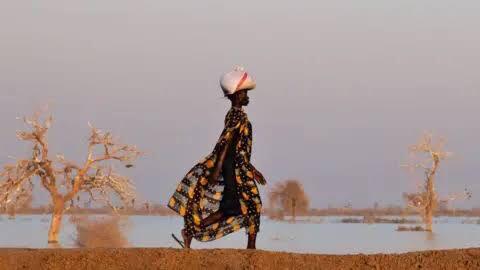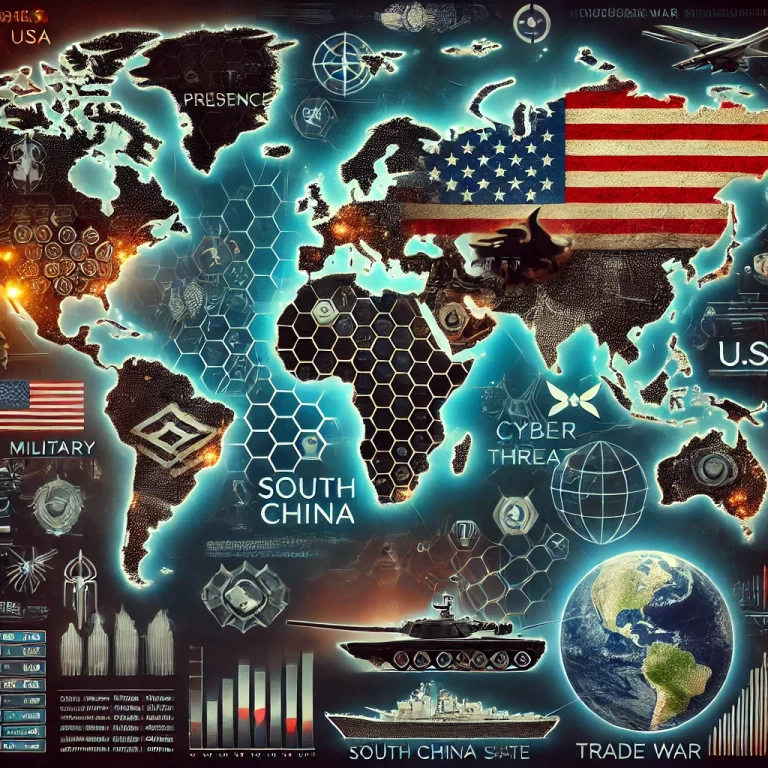
Life at 50°C: South Sudan’s Poisoned Floods – A Climate Crisis Unfolds
South Sudan, one of the world’s youngest nations, faces a devastating convergence of climate change and industrial pollution, threatening the survival of its people, environment, and future. This story unfolds in Unity State, where extreme flooding and oil contamination have turned an already fragile existence into a nightmare. Through vivid accounts and harrowing evidence, the BBC “Africa Eye” documentary captures the extent of this humanitarian and environmental crisis.
A Nation Submerged by Climate Change
Since 2019, Unity State has suffered extreme flooding, with over 70% of its area submerged at the peak in 2022. More than 700,000 people across South Sudan have been displaced, including tens of thousands forced into Bentiu, a camp originally established for war refugees but now a sanctuary for climate migrants. Once seasonal, flooding has become a year-round menace due to climate change, driving families into overcrowded shelters and leaving crops and cattle devastated.
The village elder Nyakuma recounts the daily struggles of survival in these floodwaters, from foraging for water lilies to battling diseases such as malaria. “We survive on this,” she says, holding up the roots of water lilies, which have become a staple despite their lack of nutrition. “If we didn’t have this, I don’t know how we would survive.”
Oil Pollution: A Silent Killer
The floods are exacerbated by extensive oil contamination, a legacy of mismanaged oil fields in Unity State. David Bojo Leju, a former engineer for the Greater Pioneer Operating Company (GPOC), describes an alarming pattern of oil spills, untreated waste, and outdated infrastructure. Videos he recorded show ruptured pipelines spilling toxic substances near community water sources, with the floods spreading this contamination over vast areas.
Leju warns that these pollutants seep into the soil and groundwater, creating a “silent killer” that impacts livestock and human health. This claim is corroborated by alarming statistics: 117,000 cattle have died in the past two years, with many showing deformities or being stillborn. The polluted water has also been linked to birth defects among human infants, though limited healthcare facilities prevent thorough investigations.
The Human Cost of the Crisis
For families in Unity State, life is an unrelenting fight for survival. Mothers like Nyaida must leave their children for weeks to gather wood and produce charcoal, a dangerous and physically exhausting task in flooded areas. Her children, left behind in camps, shoulder adult responsibilities, scaling fish and cooking meals in her absence.
Disease thrives in the unsanitary conditions of the camps. Waterborne illnesses and respiratory infections are common, as residents are forced to drink and bathe in polluted floodwaters. The government and international aid agencies provide limited assistance, with rations often insufficient for survival. “Seven people share one bag of grain,” says one resident, highlighting the dire scarcity.
A Government and Industry Under Scrutiny
South Sudan’s economy relies heavily on oil, with revenues estimated at £9 million per day. However, this dependence comes at a grave cost to the environment and public health. The GPOC, a consortium involving Malaysian, Indian, and Chinese companies, owns 95% of Unity State’s oil fields, leaving South Sudan with a mere 5% stake. Critics accuse the consortium of neglecting environmental regulations, and prioritising profits over people.
Efforts to hold the oil industry accountable have met resistance. Environmental audits promised by the government remain unpublished, and there is no registry to document birth defects or track pollution-related illnesses. Local officials, like Unity State’s agriculture minister, have called for investigations into the oil fields’ role in these disasters, but progress remains slow.
Resilience Amid Despair
Despite the hardships, the people of Unity State demonstrate remarkable resilience. Traditional customs, such as cattle rearing and cultural dances, have been disrupted, but communities adapt to new realities with ingenuity and determination. In Bentiu camp, women like Nyaida set up small tea shops to earn a modest income, while others collaborate to produce charcoal or forage for food in the swamps.
However, these efforts are unsustainable without systemic change. Residents demand stronger government action, international intervention, and greater transparency from the oil industry to address the root causes of their suffering.
Conclusion
In 2024, South Sudan continues to endure one of the most profound environmental and humanitarian crises in Africa. The United Nations estimates that over 8 million South Sudanese—nearly two-thirds of the population—need humanitarian assistance, with climate change and pollution being significant contributors. The flooding in Unity State alone has displaced hundreds of thousands and rendered vast agricultural lands unusable, jeopardising food security in a nation where 75% of the workforce relies on farming and cattle rearing. Meanwhile, the country’s oil resources, accounting for 98% of government revenue, remain both a lifeline and a liability. Mismanagement and pollution from oil production have caused irreparable damage to the environment, directly impacting the health of the people and livestock that form the backbone of South Sudan’s economy.
South Sudan holds immense potential as a valuable contributor to Africa’s development and the global economy. It possesses the third-largest oil reserves in Sub-Saharan Africa, with an estimated 3.5 billion barrels of proven reserves. This resource has fuelled economies far beyond its borders, with exports benefitting regional neighbours like Kenya, Uganda, and Ethiopia, as well as global markets dependent on crude oil. Additionally, its vast agricultural land, when managed sustainably, could serve as a breadbasket for East Africa, reducing reliance on imported food. However, without immediate intervention and investment, these resources may transform from assets into liabilities, further destabilising a region already scarred by conflict and climate challenges.
The crisis in South Sudan is not a national issue—it is an African and global emergency. African nations must unite to provide immediate assistance, leveraging institutions like the African Union and the African Development Bank to mobilise resources for flood relief, healthcare, and sustainable development. Regional partnerships can also facilitate infrastructure development to mitigate future flooding, such as improved drainage systems and climate-resilient agricultural practices. Countries like Uganda and Kenya, which share economic and environmental ties with South Sudan, have a vested interest in stabilising the region.
The international community must also step up, recognising South Sudan’s plight due to a global climate crisis driven predominantly by industrialised nations. Through mechanisms like the Loss and Damage Fund agreed upon at COP28, wealthier nations should prioritise financing for South Sudan to adapt to climate change, improve environmental management, and hold corporations accountable for pollution. Multinational corporations benefiting from South Sudan’s resources must also be compelled to adhere to stringent environmental standards and contribute to rebuilding affected communities.
By addressing South Sudan’s crisis with urgency and solidarity, the world can turn a story of despair into one of resilience and progress. This young nation has the potential to play a pivotal role in Africa’s development and global resource stability—but only if its people are given the tools to rise above the waters and reclaim their future.
Aric Jabari is a Fellow, and the Editorial Director at the Sixteenth Council.



